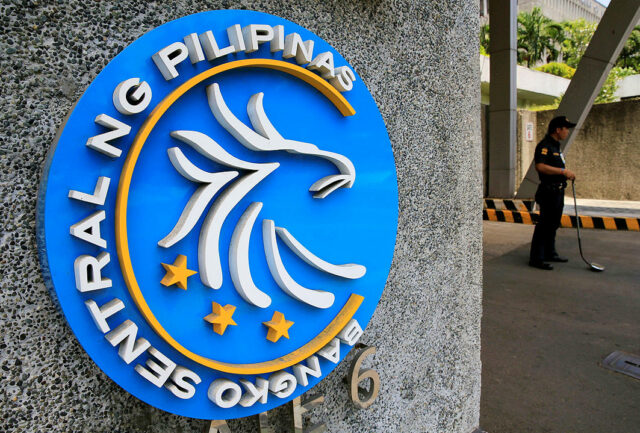
By Keisha B. Ta-asan, Reporter
THE BANGKO SENTRAL ng Pilipinas (BSP) said it plans to raise its key policy rates by 75 basis points (bps) at its next meeting, matching the US Federal Reserve’s latest monetary tightening.
The Fed delivered its fourth straight 75-bp rate increase on Wednesday, as it continues to fight persistent inflation. (Read related story “Fed jacks up interest rates again, hints at smaller increases ahead,” https://bit.ly/Fed110322)
“This supports the BSP’s stance to hike its policy rate by the same amount in its next policy meeting on Nov. 17,” BSP Governor Felipe M. Medalla told reporters in a Viber message.
He clarified that this is not an off-cycle move, saying the rate hike would take effect after the Nov. 17 meeting.
“The BSP deems it necessary to maintain the interest rate differential prevailing before the most recent Fed rate hike, in line with its price stability mandate and the need to temper any impact on the country’s exchange rate of the most recent Fed rate hike,” Mr. Medalla said.
The Fed has increased the policy by 375 bps from near-zero in March to within 3.75-4%, which was described as the fastest monetary tightening since the early 1980s.
Since May, the BSP has raised rates by 225 bps, bringing the overnight reverse repurchase facility rate to 4.25%.
“By matching the Fed’s rate hike, the BSP reiterates its strong commitment to its mandate of maintaining price stability by aggressively dealing with inflationary pressures stemming from local and global factors,” he added.
Mr. Medalla reiterated that the BSP is ready “to take necessary policy actions to bring inflation toward a target-consistent path.” He projected inflation to return to the 2%-4% target band in the second half of 2023 and the full-year 2024.
“The BSP governor has telegraphed his preference to match Fed rate hikes from hereon to maintain a 100-bp spread over the Fed funds rate,” ING Bank N.V. Manila Senior Economist Nicholas Antonio T. Mapa said in an e-mail.
“As such, market had priced in a 75-bp rate increase at the next meeting. Today’s commitment to increasing rates validates this forward guidance and should steady the peso even if the actual differential is now only 25 bps,” he added.
Former BSP Deputy Governor Diwa C. Guinigundo said matching the US Federal Reserve is “very appropriate considering the BSP’s inflation forecast of 7.1-7.9% for October and 5.6% for the full-year average.
October inflation data is scheduled to be released today (Nov. 4).
“Real policy rate continues to be negative and that could further drive foreign exchange (FX) outflows and that needs to be addressed by an interest rate action,” Mr. Guinigundo said in a Viber message.
“The BSP cannot also continually depend on heavy FX (foreign exchange) intervention that could reduce its FX reserves sharply. Adverse market reaction is something we all want to avoid. After all, the Philippine economy remains resilient enough to absorb more rate adjustments.”
The peso dropped to a record low of P59 against the US dollar in late September.
On Thursday, the peso closed at P58.80 versus the dollar, losing 33 centavos from its P58.47 finish on Wednesday, Bankers Association of the Philippines data showed.
As of Thursday’s close, the peso has declined by P7.89 or 13.3% against the greenback from its P51 close on Dec. 31, 2021.
Mr. Medalla previously said the BSP was active in the forex market to prevent “excessive” movements.
As of end-September, the country’s dollar reserves stood at $95.01 billion, down 2.4% from the $97.44 billion as of end-August.
Asked if the BSP should match the US Federal Reserve’s further tightening in December, Mr. Guinigundo said it will depend on the inflation outlook in the Philippines and the United States.
The BSP will have its last policy review for the year on Dec. 15.
“If we see US inflation starting to ease, that should signal a more measured adjustment by the US Fed. For the BSP, if the domestic inflation starts behaving better, BSP can likewise undertake more measured adjustment,” he said.
“Otherwise, if US inflation does not cease rising, US Fed might have to sustain its intensity of tightening. More upward blips may be expected in the future. Then the BSP should monitor if there is a window for sustaining less aggressive stance provided domestic inflation falls within target.”
Fed Chair Jerome H. Powell, speaking at a news conference after the end of the central bank’s latest policy meeting, said he wanted no confusion on that point: Even if policy makers do scale back future increases, he said, they were still undecided about just how high rates would need to rise to curb inflation, and were determined to “stay the course until the job’s done.”
“The question of when to moderate the pace of increases is much less important than the question of how high… and how long to keep monetary policy restrictive,” Mr. Powell said, adding that it was “very premature” to discuss when the Fed might pause its increases.
Meanwhile, Mr. Mapa said higher interest rates would lead to an overall slower economic growth as higher credit costs would affect the ability of businesses and consumers to secure loans.
“Net impact of higher rates will eventually be slower growth, slower job creation and just a little less inflation both in the near term and medium term,” he said. — with Reuters
BSP to match Fed’s 75-bp rate hike
Source: Bantay Radio
0 Comments